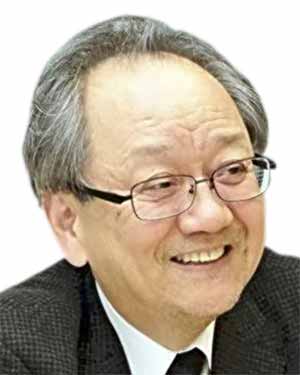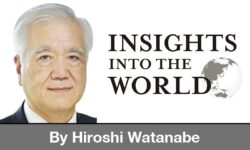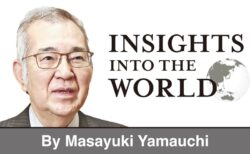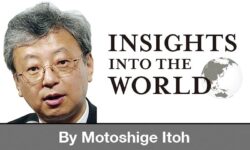14:00 JST, July 22, 2022
China, a single-party authoritarian state, has realized fast economic growth by fully capitalizing on the vitality of the market economy. In that process, crafty technocrats have played a large role, taking advantage of the leniency of the relevant laws to moderately intervene in the country’s private economic sector. Admittedly, it is an irony of history that a socialist state reminds me anew of the harsh reality of a competitive economy — only the fittest will survive. At the same time, however, the force of widening income inequality — the negative side of market economies — has definitely been operating in China as well, with uneven distribution and immobilization of wealth and income progressing unabated.
When I was a student in the mid-1960s, university courses on “economic systems” focused primarily on comparisons between the “ideals” of Soviet-style socialist planned economies and the “realities” of harshly competitive economies. An overwhelming number of courses served as platforms to passionately tout the former. As a result, more than a few people at Japanese universities dreamed of the rationality of socialist planned economies despite not having any knowledge, direct or indirect, about their realities.
But times have since changed. The Chinese Communist Party has been pushing its way toward encouraging enterprises to pursue profits, affirming the private ownership of manufacturing facilities and promoting measures to make not only capital, but also labor and land liquid or transferable. Indeed, the Chinese economy has evolved in a way reminiscent of the neoliberal economic policies then U.K. Prime Minister Margaret Thatcher and then U.S. President Ronald Reagan advocated in the 1980s.
Immobile income gap
According to an academic article which assessed recent changes in income distribution in China, income inequality at the household level there has greatly increased both among provinces and between urban and rural areas in the past four decades. As far as the latest decade is concerned, such inequality has stabilized at high levels, meaning that income distribution has become fixed in recent years with no signs of equalization.
Furthermore, a factor-by-factor analysis of the levels of inequality across China shows a decline in the impact of factors related to urban-rural disparities and interregional inequality. An increase in “capital income” — which derives not from labor but from capital — has been pointed out as a new trend contributing to the escalation of overall inequality in China.
A notable point is that in China, there exists a distinctly negative correlation between the extent of inequality in income distribution and that of “income mobility,” which refers to the extent to which people move up or down the income strata. Put differently, the income strata tend to become increasingly immobile in those areas and times in which inequality increases. So, the so-called Great Gatsby Curve, which shows how inheritable richness and poverty are, is observed in China as evidence that the stratification of Chinese society, based on asset and income levels, is progressing.
In recent years, income growth of male Chinese workers with higher education in their prime has emerged as a major factor for widening income inequality. Wages and salaries for the Chinese elite with higher education have been on the rise thanks to the ongoing privatization of state-owned enterprises, the liberalization of trade and investment and the advances of cutting-edge technologies that require higher skills. This trend has caused the income gap among workers to widen with increased “capital income” seen as a major reason for the immobilization of income inequality.
Such a state of income inequality, if left unattended, can lead to pent-up social discontent. This is exactly why the Chinese leadership recently had to declare the launch of a “Common Prosperity” policy to redress income inequality by redistributing “donations” from electronic commerce and information technology giants such as Alibaba and Tencent. It is quite understandable that the policy goal of Common Prosperity reflects the strong will of Chinese President Xi Jinping to hold on to power — he is known to be seeking a third term as Chinese Communist Party general secretary at the next party congress scheduled for this autumn.
U.S. no different
Regarding income inequality, the United States is no different from China. U.S. statistics clearly show that the U.S. middle class, as defined on the basis of income strata, has been shrinking since 1970. For their part, wealthy Americans advocate a “small government,” demanding that public spending on social security and education be slashed. On the other hand, an overwhelming majority of low-income white workers tend to vote for conservative politicians who give little thought to their interests. They do so because they are instilled with a prejudice that their hard-earned tax money is injected into the non-white population. They think that neither labor unions nor the Democratic Party would help them. In the United States, there are many low-income people who think that their country is leaning toward oligarchy — namely the rule of a small handful of rich magnates. They also think that the United States is paving the way toward statecraft that is inconsistent with a democracy that upholds equitable distribution of interests to a majority of its population.
Increased inequality and political corruption that are the defects — consequences — of the intense energy generated by capitalism can be found both in China and the United States. However, to what extent such flawed phenomena surface and in what forms they become palpable vary from country to country. Given that the U.S.-style capitalist system provides room for “self-purification” to work, thanks to freedom of speech and the press, cases of corruption are more likely to be uncovered. In this context, speech and the press can play a great role vis-a-vis political corruption.
Political corruption distorts the normality of market mechanisms, eventually weakening market forces. Bribery, in particular, threatens to restrain investment and, therefore, retard economic growth as funds are pocketed by those in power to enrich themselves, instead of being used for genuine investment.
Economists tell us that how harmful bribery is to economies depends on the extent to which autocratic leaders “monopolize” the act of corruption. When an autocratic leader and his or her family fully monopolize bribes, a national economy and its taxpayers suffer less. Indonesia is often referred to as a typical case of this as it achieved economic growth while then President Suharto was in power. Bribery committed by the Suharto family did not constitute a major growth constraint. In fact, the goal of the Suharto-era bureaucratic discipline and control was not to eliminate bribes, but to enable his family to monopolize them. During his rule, Suharto and his family reportedly amassed a fortune of at least $15 billion, but Suharto-era bureaucrats kept the Indonesian markets functioning sufficiently.
An opposite example of corruption can be found in the Russian Federation that emerged after the collapse of the Soviet Union. In Russia, public officials with every job title assigned to every part of the government scrambled to receive bribes. As corruption was so widespread, the function of markets in Russia was significantly jeopardized. Compared with Indonesia, wealth accumulation through bribery in Russia might have occurred to a lesser extent. Nevertheless, with bribery rampant vertically and horizontally in Russian society, an investment boom did not emerge, keeping the country as a state “sleeping on energy resources” and failing to grab opportunities for robust economic growth.
Following the fall of the Soviet Union, many super-rich business tycoons called oligarchs exerted their political influence on the privatization of state-owned energy enterprises. As such, there was no reason for these oligarchs to be at odds with Russian President Vladimir Putin.
Wealthy tech elite
As the above-cited examples show, the relationship between the wealthy and politicians in power reflects the circumstances of each country. When Xi came to power, China embarked on an “anti-corruption struggle,” apparently against the background that corruption had been terribly pervasive among authorities at every level in every sector at both central and provincial administration organizations.
In China, its new elite, comprising those entrepreneurs who have amassed fortunes owing to rapid growth of the tech-related private sector, constitute a “new class” who have won out among the competition. What kind of political power will this emerging class obtain from now on? As discussed in the early part of this article, the progress and immobilization of income inequality have the potential for triggering social instability. That said, what is equally important is the question of what kind of equilibrium the wealthy elite in the new class and the leadership of the Chinese Communist Party will come to after confronting each other — going through struggles and eventually agreeing on collusion. The degree of intrinsic instability in China’s domestic politics is greater than imagined.

Takenori Inoki
Takenori Inoki is a professor emeritus at Osaka University, where he also served as dean of the economics department. His previous posts included special professor at Aoyama Gakuin University and director general of the International Research Center for Japanese Studies.
Top Articles in Editorial & Columns
-

Riku-Ryu Pair Wins Gold Medal: Their Strong Bond Leads to Major Comeback Victory
-

40 Million Foreign Visitors to Japan: Urgent Measures Should Be Implemented to Tackle Overtourism
-

University of Tokyo Professor Arrested: Serious Lack of Ethical Sense, Failure of Institutional Governance
-

China Provoked Takaichi into Risky Move of Dissolving House of Representatives, But It’s a Gamble She Just Might Win
-

Policy Measures on Foreign Nationals: How Should Stricter Regulations and Coexistence Be Balanced?
JN ACCESS RANKING
-

Japan PM Takaichi’s Cabinet Resigns en Masse
-

Japan Institute to Use Domestic Commercial Optical Lattice Clock to Set Japan Standard Time
-

Israeli Ambassador to Japan Speaks about Japan’s Role in the Reconstruction of Gaza
-

Man Infected with Measles Reportedly Dined at Restaurant in Tokyo Station
-

Man Infected with Measles May Have Come in Contact with Many People in Tokyo, Went to Store, Restaurant Around When Symptoms Emerged




















